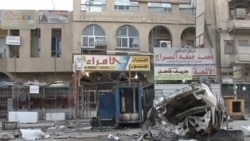Police in Iraq say a string of Monday evening bombings in Baghdad has left at least 38 people dead.
Officials say the bombs went off shortly after nightfall and struck at least eight different neighborhoods. They say most of the attacks were in predominately Shi'ite districts, although several went off in either mainly Sunni neighborhoods or mixed areas.
Earlier Monday, roadside bombs targeted Iraqi security forces, killing at least five.
Monday's attacks follow a bombing on Sunday that targeted an elementary school and a series of bombings on Saturday targeting Shi'ite pilgrims.
On Sunday, al-Qaida claimed responsibility for a rare bomb attack in the usually peaceful Kurdish region last month.
There was no immediate claim of responsibility for Monday's attacks, but al-Qaida's branch in Iraq has frequently used suicide bombers and car bombs against Shi'ite civilians in an effort to undermine the Shi'ite-led government. The group's ideology considers Shi'ites heretics.
Deadly violence has climbed to its highest level since 2008, and analysts express fears that Iraq is sliding back into a Sunni-Shi'ite civil war.
Officials say the bombs went off shortly after nightfall and struck at least eight different neighborhoods. They say most of the attacks were in predominately Shi'ite districts, although several went off in either mainly Sunni neighborhoods or mixed areas.
Earlier Monday, roadside bombs targeted Iraqi security forces, killing at least five.
Monday's attacks follow a bombing on Sunday that targeted an elementary school and a series of bombings on Saturday targeting Shi'ite pilgrims.
On Sunday, al-Qaida claimed responsibility for a rare bomb attack in the usually peaceful Kurdish region last month.
There was no immediate claim of responsibility for Monday's attacks, but al-Qaida's branch in Iraq has frequently used suicide bombers and car bombs against Shi'ite civilians in an effort to undermine the Shi'ite-led government. The group's ideology considers Shi'ites heretics.
Deadly violence has climbed to its highest level since 2008, and analysts express fears that Iraq is sliding back into a Sunni-Shi'ite civil war.






